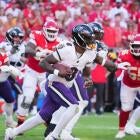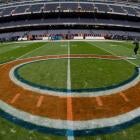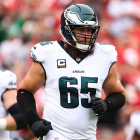
Comparing Dolphins offense to historic units: Peyton Manning's Broncos, Rams' 'Greatest Show on Turf' lead way
The Dolphins match up very well with some of the NFL's greatest offenses

It's only been five games, but the Miami Dolphins offense has the look of a historically dominant group. Mike McDaniel's offense -- which is on pace to break the 2013 Broncos record for points scored in a season -- is an explosive unit that can beat you in a variety of ways.
No one knows that better than the Broncos, who surrendered 70 points to the Fins back in Week 3. Miami stubbed its toe a bit the following week in Buffalo but regained its footing after scoring 31 points in a Week 5 win over the Giants. This weekend, the Dolphins will try to exploit a Panthers defense that is currently 28th in the NFL in scoring.
The Dolphins offense has been led by quarterback Tua Tagovailoa, wideouts Jaylen Waddle and Tyreek Hill and running backs Raheem Mostert and De'Von Achane and an offensive line that is performing as well as any unit in football. Miami will be without Achane for several weeks, however, after the rookie standout was placed on injured reserve after sustaining a knee injury against the Giants.
Miami's offense has already drawn comparisons to some of the most prolific offenses in NFL history. With that in mind, we decided to take a chronological look at some of the NFL's elite offenses of the past and comparing them to the offense that currently resides near South Beach.
1974 Raiders
John Madden's offense featured more Hall of Fame players (7) than any unit in NFL history. It was led by quarterback and league MVP Kenny Stabler and a receiving corps that featured three future Hall of Famers in wideouts Fred Biletnikoff, Cliff Branch and Dave Casper. The offensive line, which boasted three future gold jackets, helped the Raiders produce nearly as many rushing yards as passing yards.
How Dolphins compare: Miami's offense compares favorably with Madden's iconic group. Specifically, both teams boast strong offensive lines that thrived in both pass protection and in run support. Both offenses also were a threat to score quickly via the big play, but the Raiders' big play was more likely to come through the air whereas Miami is capable of getting a big play via the ground or through the air.
1979 Steelers
A team that leaned on defense earlier in the decade, Pittsburgh's offense led the NFL in scoring during its fourth and final Super Bowl season of the 1970s. Terry Bradshaw, fresh off an MVP season, continued to have success that season throwing the ball two Hall of Fame wideouts John Stallworth and Lynn Swann. Hall of Fame running back Franco Harris led a trio of running backs who each had runs of at least 70 yards during the regular season.
How Dolphins compare: Turnovers are the biggest difference between the two units. Pittsburgh won it all that season despite leading the NFL in turnovers. Miami is much better at taking care of the ball, but unlike the Steelers (who had a defense that allowed them to take chances), the Dolphins have to take care of the ball in order to increase their odds at victory.
This game was SUPER 😏
— Pittsburgh Steelers (@steelers) September 28, 2019
Coming in at #️⃣9️⃣2️⃣ on the #NFL100 Greatest Games countdown: Super Bowl XIV. pic.twitter.com/W9S4yWjqXx
1981 Chargers
Air Coryell's offense was perfectly piloted by Dan Fouts, who that season threw for a then-NFL record 4,802 yards. Along with having two Hall of Fame pass catchers, Fouts had the benefit of a talented backfield that featured Chuck Muncie and James Brooks. The duo combined to catch 89 passes and score 25 total touchdowns with Muncie rushing for 19 touchdowns, which was at the time tied for the second-highest single season total ever.
How the Dolphins compare: Ironically, the '81 Chargers defining moment came in an epic playoff win over the Dolphins in Miami. The Chargers came up short, however, the following week against the Bengals in an AFC Championship Game that was played in -59 degree wind chill. The Chargers offense scored just seven points in Cincinnati that day while succumbing to the elements. Will the Dolphins offense suffer the same fate? Time will tell.
#Chargers quarterback Dan Fouts likened throwing the ball in the gusty, icy #Cincinnati winds to being "almost like going out in the wind and throwing a shoebox".
— Kevin Gallagher (@KevG163) January 11, 2023
"The Freezer Bowl", OTD in 1982 pic.twitter.com/7GscIio0MG
1983 Washington
The defending Super Bowl champions scored a then-NFL record 541 points. Like Fouts, Washington QB Joe Theismann (the league's MVP that season) was complemented by a formidable running back duo. Reigning Super Bowl MVP John Riggins ran for a then-record 24 touchdowns, while back mate Joe Washington caught six touchdowns. Washington's strength, however, was its physical offensive line that was appropriately nicknamed "The Hogs."
How the Dolphins compare: The Dolphins' strengths are similar in that they have two receivers in Waddle and Hill that demand extra attention. The Raiders dismantled Washington in the Super Bowl, however, because they had two elite cornerbacks who were able to cover Art Monk and Charlie Brown without any help. That allowed the Raiders to focus more on shutting down Riggins while putting more pressure on Theismann. That's basically the formula for stopping the Dolphins now.
It remains the record for the most points ever scored by an AFC team in a Super Bowl.#OTD in 1984, @Raiders dominated Washington in Super Bowl XVIII, winning by a score of 38-9 to claim their only championship while in Los Angeles.
— Pro Football Hall of Fame (@ProFootballHOF) January 22, 2023
🎥: @NFL pic.twitter.com/Np0upSHNo1
1989 49ers
While they weren't historically prolific during the regular season, the 49ers scored a Super Bowl-record 55 points in a 45-point beatdown of Denver. Joe Montana took full advantage of having future Hall of Fame wideout Jerry Rice as his disposal; the two connected for three scores in Super Bowl XXIV as Montana threw a then-Super Bowl record five touchdowns. Montana was also aided by versatile running back Roger Craig, 1,000-yard receiver John Taylor and sure-handed tight end Brent Jones.
How the Dolphins compare: Like the Dolphins, the 49ers were a cerebral unit that beat you with both precision and with big plays. Both units also possessed a game-breaking receiver (Rice and Hill). Miami has the better running game, though, as the '89 49ers averaged a pedestrian 4 yards per carry.
OTD the #49ers went back-to-back!
— San Francisco 49ers (@49ers) January 28, 2018
Relive Super Bowl XXIV pic.twitter.com/SPSZYAQakq
1991 Washington
Joe Gibbs' offense scored at least 33 points 10 times that included 37 points against the Bills in Super Bowl XXVI. Super Bowl MVP Mark Rypien had a field day throwing the ball to Hall of Famer Art Monk and four-time Pro Bowler Gary Clark. Washington's backfield had three solid backs, led by Earnest Byner. Gerald Riggs, Washington's third-string running back, ran for 11 touchdowns in the regular season and six more during the playoffs.
How the Dolphins compare: Both offenses possess dynamic receiving duos, strong offensive lines and deep backfields. And while Rypien was great that season (especially on deep throws), the Dolphins have the advantage at quarterback with Tagovailoa.
1992 Cowboys
This might be the most complete offense in NFL history. Anchored by the "Great Wall of Dallas," the Cowboys "Triplets" of Troy Aikman, Emmitt Smith and Michael Irvin each put up big numbers that season, with Smith becoming the first rushing champion to win the Super Bowl. The Cowboys offense also included six-time Pro Bowl tight end Jay Novacek and fullback Daryl "Moose" Johnston.
How the Dolphins compare: Tight end is where the Cowboys have a clear-cut advantage. Dallas took full advantage of Novacek's talents while making him a vocal point of the offense. Miami's offense, by design, really doesn't focus too much on the tight ends' involvement in the passing game.
The first title of the 1990's @dallascowboys dynasty. ⭐️
— NFL (@NFL) April 13, 2020
Rewatch the entirety of Super Bowl XXVII for FREE with NFL GamePass: https://t.co/3yQtk4tAZ4 pic.twitter.com/AaklJrCsZU
1994 49ers
With Steve Young leading the way, the '94 49ers scored at least 31 points in 13 games that included 44, 38 and 49 points in their three playoff games. Young was masterful that season; the left-hander won league and Super Bowl MVP after throwing a Super Bowl-record six touchdowns against the Chargers. Along with Rice, Taylor, and Jones, Young's talent was complemented by versatile running back Ricky Watters, who became the second running back (Roger Craig being the first) to score three touchdowns in the Super Bowl.
How the Dolphins compare: Like the '89 team, the '94 49ers were not a great running team as they averaged just 3.9 yards per carry. Miami, by comparison, is averaging a staggering 6.9 yards per carry.
1998 Broncos
This offense had it all. A future Hall of Fame quarterback in John Elway, a 2,000-yard running back and league MVP Terrell Davis, two 1,000-yard receivers in Rod Smith and Ed McCaffrey, and one of the greatest tight ends in NFL history in Shannon Sharpe. Denver's line featured three Pro Bowlers that included Mark Schlereth, who was part of Washington's dominant line seven years earlier.
How good was this offense? The Broncos scored 38, 41, 27 and 30 points during the four regular-season games Elway missed due to injury. Elway returned and capped off his career with an MVP performance in the Super Bowl.
How the Dolphins compare: Similar to the '92 Cowboys, the Broncos' tight end situation gives them a clear edge over Miami.
“To go back to back, no one thought we could do it.”
— Denver Broncos (@Broncos) April 19, 2020
📺: Super Bowl XXXIII today at 1pm MT on FOX pic.twitter.com/LOUdZpK3gn
1998 Vikings
Minnesota's 556 points broke Washington's 15-year-old record. Randall Cunningham enjoyed a resurgence that season while airing it out to future Hall of Famers Cris Carter and Randy Moss. A rookie that season, Moss' 17 touchdown catches remain the record for a first-year player.
How the Dolphins compare: While Robert Smith was a Pro Bowler that season, the Dolphins possess a stronger running game.
1999 Rams
The offense by which every prolific offense since has been measured. The "Greatest Show on Turf" took the league by storm and spearheaded the Rams' unexpected Super Bowl run. St. Louis offense featured four future Hall of Famers and perennial Pro Bowler Torry Holt. Marshall Faulk made history that season by becoming the second player to tally 1,000 yards both rushing and receiving.
How the Dolphins compare: Miami should take no shame in coming up short here. St. Louis had a deeper receiving corps and Faulk, who would win league MVP the following season. Miami's does have the edge as far as running back depth is concerned.
“The whole team just had a swag to them, and it was electrifying!” 💥@Nelly_Mo on the 1999 St. Louis Rams 👇 #NFL100
— NFL Network (@nflnetwork) November 16, 2019
📺: NFL 100 GREATEST TEAMS on NFL Network pic.twitter.com/NRnlr52AkA
2004 Colts
League MVP Peyton Manning broke Dan Marino's 20-year-old record for touchdown passes in a season (49). He did most of his damage that season throwing to his trio of 1,000-yard receivers that was led by future Hall of Famer Marvin Harrison. Future Hall of Fame Edgerrin James wreaked havoc on opposing defenses by gaining over 2,000 all-purpose yards.
How the Dolphins compare: Like the '81 Chargers, the '04 Colts were slowed by nasty weather in the playoffs. Not helping matter for the Colts was a Patriots defense that flustered Manning while coming down with three interceptions. It'll be interesting to see if the Dolphins fare better if they are in a similar position down the road. This is where their running game (and their commitment to running the ball) will come into play.
2007 Patriots
Led by Tom Brady's 50 touchdown passes, the '07 Patriots scored an NFL-record 569 points. Nearly half of Brady's touchdown passes went to Moss, who broke Jerry Rice's record for the most touchdown catches in a season. Wes Welker caught 112 passes that season while helping New England go a perfect 16-0 during the regular season.
How the Dolphins compare: Miami is a far superior running team. The Patriots were OK there, but their lack of a dominant running game loomed large in New England's shocking Super Bowl loss to the Giants.
The 2007 Patriots were perfect until they weren't.
— Pro Football Hall of Fame (@ProFootballHOF) February 3, 2023
15 years ago today, @EliManning and @plaxicoburress connected for a TD with 35 seconds remaining in Super Bowl XLII, lifting the @Giants to a stunning 17-14 win over New England.
📹: @NFL pic.twitter.com/0MSZA4xd9t
2011 Saints
Drew Brees put up video game numbers, but the real unique part of the Saints offense that season was the incredible depth at running back. New Orleans' stable of backs was led by Darren Sproles, who caught 86 passes for 710 yards and seven touchdowns while also averaging 6.9 yards per carry.
How the Dolphins compare: Miami has the edge here as far as big-play ability is concerned. The Saints didn't have a run over 36 yards and didn't have a receiver like Hill that could take the top off a defense.
2013 Broncos
The first team to score over 600 points in a season, the '13 Broncos received a historic season from Manning, who set single-season records with 5,477 yards and 55 touchdowns. Demaryius Thomas led a quartet of Denver wideouts that caught at least 10 touchdown passes.
How the Dolphins compare: The Broncos were held to eight points in the Super Bowl largely because of turnovers and Denver's overreliance on Manning's arm. While they're not as prolific through the air, the Dolphins have a more balanced offense.
2018 Chiefs
Patrick Mahomes' breakout season included 50 touchdown passes, nearly 5,100 passing yards and an MVP award. Mahomes' top targets, Tyreek Hill and Travis Kelce, caught a combined 190 passes for 2,815 yards and 22 touchdowns.
How the Dolphins compare: Both of these offense have Hill, but the Dolphins have the edge at running back as Mahomes finished the year as the Chiefs' second-leading rusher. Miami will have to find its version of Sammy Watkins, who made several clutch catches during his time in Kansas City.
2019 Ravens
The '19 Ravens scored the 11th-most points in NFL history and rushed for a single-season-record 3,296 yards. Lamar Jackson enjoyed a season for the ages; he won MVP honors after leading the NFL in touchdown passes and breaking Michael Vick's single-season record for rushing yards by a quarterback.
How the Dolphins compare: Miami may have met its match in the running game, but it has a clear advantage at receiver. Baltimore's lack of deep threats that season contributed to the Ravens bowing out in the divisional round of the playoffs.


















